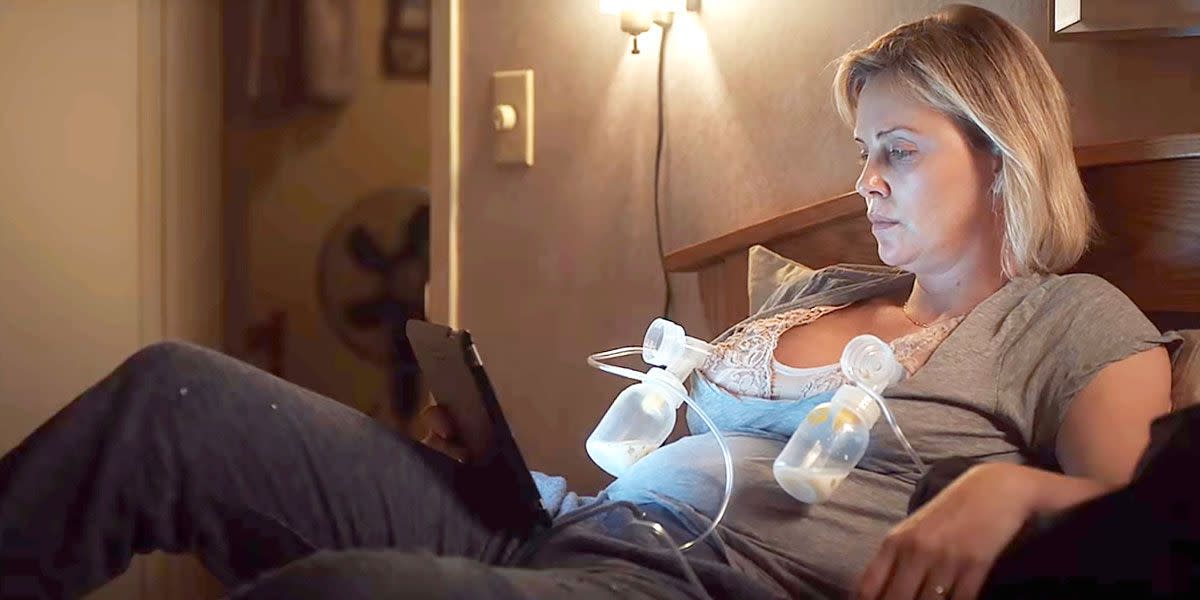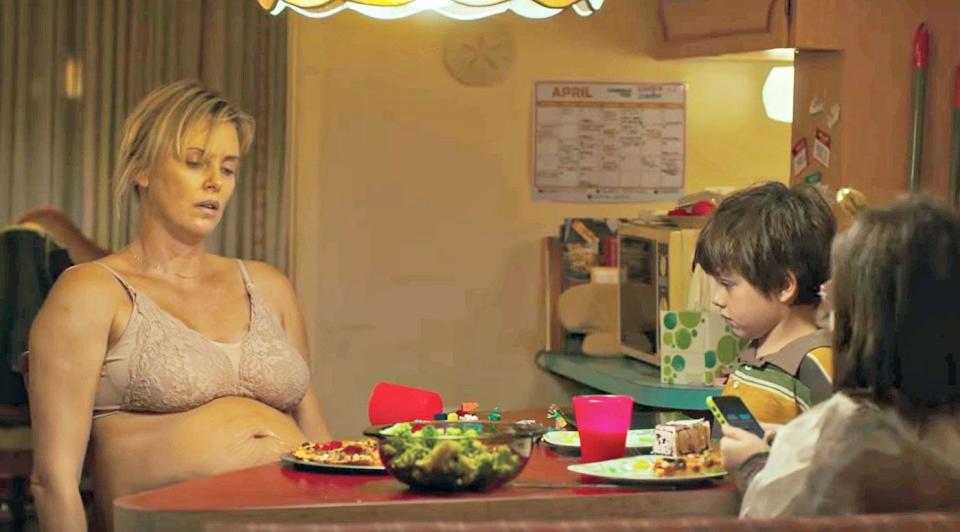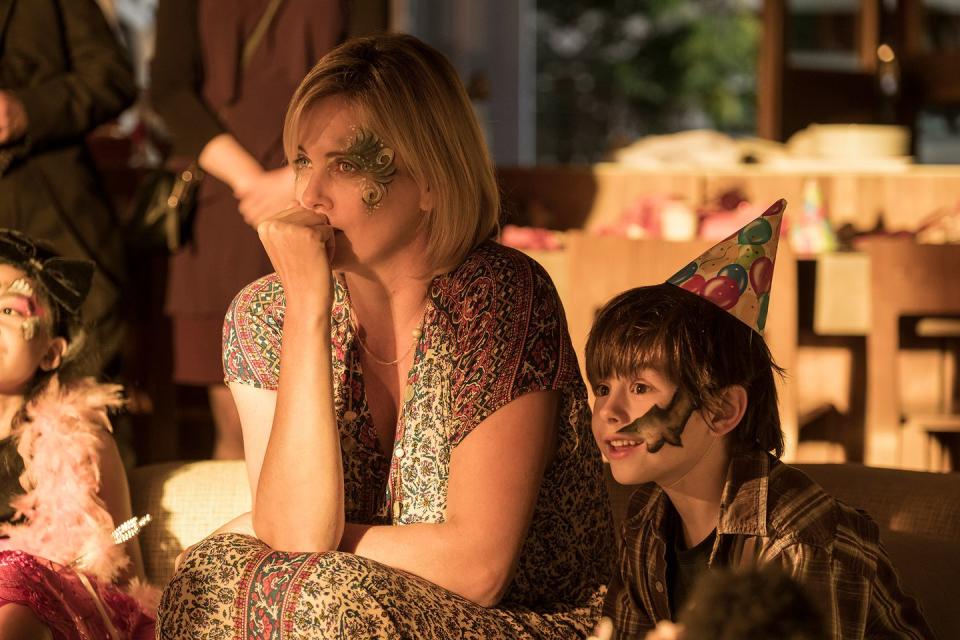Why the Big Twist in 'Tully' Is So Controversial

This post contains spoilers about Tully.
While everyone was freaking out about spoilers for Avengers: Infinity War last week, I saw an advanced screening of Tully (now in theaters) and immediately felt protective of its big twist. Who cared about Thanos? I didn't want anyone to ruin this intimate drama for audiences.
Tully, directed by Jason Reitman and written by Diablo Cody, the same team behind Juno and Young Adult, doesn't really seem like the type of movie where there would be some big shocker. On the surface, it's a wholly naturalistic drama, plus or minus a few of Cody's signature quips. (Honest to blog!)
Charlize Theron plays Marlo, who at the beginning of the movie is a very pregnant mother of two. When number three arrives, she's at her wits' end, so she gives in and calls a night nanny suggested by her wealthy brother. One evening, her new employee shows up at her house beaming and introducing herself as Tully (Mackenzie Davis). As you watch, you come to realize there is something off about this impossibly cool 20-something with her crop tops and chain choker. She's not just wise beyond her years, she's almost prophetic. And that's where things get weird.
While I do think you should see the movie cold, there's a lot to unpack. Let's discuss.
What's the twist?
Tully was never actually there because Tully isn't a flesh-and-blood human. She and Marlo are one in the same, with Tully representing Marlo's life before she had children. In the climactic sequence, the two appear to take a trip to Bushwick, where Marlo lived before she started a family. (I say "appear" because it's really just Marlo at it alone.) They drink, they thrash around to metal, and get in a fight when Tully tells Marlo she's quitting. During the drive home, Tully falls asleep and thus so does Marlo, crashing her car into a body of water. That's when the action turns dreamlike. Tully swims up to Marlo as a mermaid, and helps her escape. Marlo survives, but she's alone in the hospital. The doctor asks her husband, Drew (Ron Livingston), about her mental health. The mention of her maiden name-which is, yup, Tully-affirms that there was never a night nanny. Tully was a manifestation of Marlo's former self, which she conjured out of desperation.

Could you see it coming?
Kind of. After the reveal, what initially seemed like plot holes, start to seem like clues. For a while there, Tully is a frustratingly vague character. Even though she looks like she might be a Brooklyn native rather than a suburban denizen, there is no sense of where she's from. She never shares any details of her upbringing, though she does seem to be repository for random knowledge, name-dropping Samuel Pepys and saying things like, "I'm like Saudi Arabia, I have an energy surplus." Turns out these are all just facts Marlo once knew but buried deep. Everything we're learning about Tully is just background information about Marlo. Just before they drive into the city, the younger woman vents in frustration about a conflict with a roommate. Marlo encourages her to leave that person behind. Earlier we met a former friend of Marlo's who still lives in the same apartment in Bushwick they once shared. In talking to Tully, Marlo's not doling out advice, she's justifying her own choice.
Perhaps the biggest hint is what otherwise seemed like the movie's most unnerving moment. Tully, fully sanctioned by Marlo, creeps into Drew's bedroom wearing a cute diner waitress outfit, acting out his sexual fantasy. She mounts him, and Marlo says she'll coach her about what he likes as they proceed to have sex. At the time, it's bizarre that Drew isn't totally freaked out, considering he hasn't officially met Tully when this happens. Cody is directly referencing the Lifetime movie tropes of the sexy-but-evil-nanny who boinks the husband, but it's all actually a misdirect. Drew's not surprised by the strange woman in his bedroom, he's surprised by his wife's newfound desire for sexual intimacy. The scene remains disconcerting, but not in the way you think.

Has the movie gotten backlash?
Some, for sure. Critics have largely responded positively to the film, but there's controversy brewing in certain corners of the Internet. A post on the blog Motherly criticizes the film for not being explicit enough about Marlo's postpartum psychosis, and not featuring scenes of her getting treatment. "My strong concern here is that this movie which presents itself as validating the experience of motherhood is sending the message that these symptoms are normal," Diana Spalding writes. "They are common yes. But they deserve to be respected and attended to, not dismissed." An official statement from Ann Smith of Postpartum Support International reads, "In one scene, there is mention that Charlize Theron's character had a bit of depression following the birth of the previous baby," she said. "As a Certified Nurse Midwife, here's what I wanted to see next. I wanted to see her be screened, to get the treatment and the support she needed so that she can get well." Elsewhere, Graeme Seabrook of All the Moms condemned the movie in a piece titled "Why I won't see 'Tully' and why you should think twice before you do."
For her part, Cody told the New York Times that Marlo isn't afforded the "comfort" of treatment in the film, which is "meant to be uncomfortable.” Anyone who has seen the bitter Young Adult can attest to the fact that Cody, Reitman, and Theron-who do not claim to be documentary filmmakers-enjoy making people squirm.

Does it work?
The revelation isn't exactly a knock your socks off moment, given that you can sort of sense something is coming, but it has an emotional resonance that outweighs its gut punch. Suddenly, the movie becomes not just about the difficulties and demands of motherhood, but about the decisions we make as women that lead us to that point. Tully isn't a hipster angel who helps Marlo be a perfect parent with her chirps of wisdom. She's a reminder that the protagonist is living the life she wanted, and that's a completely valid choice even if it's disappointing at times.
There's a sweetness to the ending and a glimmer of hope, but the issue of Marlo's mental health is left unresolved. We don't necessarily know that Marlo is going to be okay. Tully isn't a solution. She's a symptom.
Follow Esther on Twitter.
You Might Also Like

